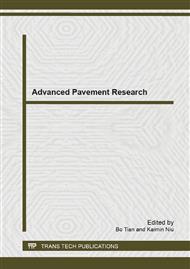p.133
p.141
p.147
p.160
p.166
p.173
p.183
p.190
p.200
Research on Roller Compacted Concrete Graduation with Vibration Liquefaction
Abstract:
In the rolling process, reasonable way of grading and rolling can improve the compactness and anti-permeability of roller compacted concrete (RCC), as well can make its strength meet the design requirements. Vibration liquefaction is the key step for RCC in the rolling process. Therefore, this paper first puts forward the more suitable method, Modified Vebe Vibration Liquefaction Test, to account for the characteristics of vibration liquefaction in RCC, and then, studies the coarse aggregate gradation scope using aggregate gradually filling theory. Though Modified Vebe Vibration Liquefaction Test, the research show that the aggregate VCA and the characteristics of vibration liquefaction of RCC have a good correlation. Finally, by studying the sand ratio and fineness modulus of sand how to affect the performance of liquefied RCC, the optimum value range of sand ratio and fineness modulus of sand was determined.
Info:
Periodical:
Pages:
166-172
DOI:
Citation:
Online since:
December 2013
Authors:
Keywords:
Price:
Сopyright:
© 2014 Trans Tech Publications Ltd. All Rights Reserved
Share:
Citation:


